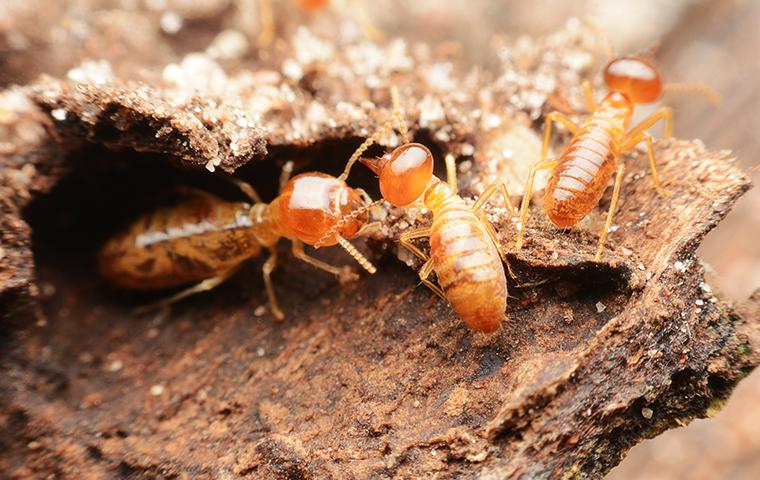Termite Identification & Prevention
(Isoptera)
What Are Termites?
Termites are wood-eating pests that often invade our New Jersey structures and cause costly damage. In our area, the subterranean termite is the most widespread species. These termites nest underground, have high moisture needs, and like all termites, feed on the cellulose found in wood and other plant materials.

Subterranean termites are social insects that live and work together in large groups. To be as successful as possible, they divide their colonies into different groups or castes. Each group has its own tasks assigned to it:
Workers
These termites are the most numerous and are responsible for leaving the nest each day to gather food for all the colony members. They also build and maintain mud tubes and nests and care for the young termites living in the nest.
Soldiers
These termites have larger heads and jaws and use them to help defend the colony from predators and other dangers. They also help build the nest and care for the young termites.
Reproductives
Are Termites Dangerous?
Termites are silent destroyers; they move in and out of our buildings through the ground without us knowing, sometimes for months or years at a time. Their ability to stay under our radar enables them to cause more than five billion dollars in damages to structures across the country each year. As termites invade and tunnel through the wood in your home, they weaken its structural integrity.
Why Do I Have A Termite Problem?
Termites require a lot of food to feed the colony members. A single termite colony can contain tens of thousands to more than a million members; that is a lot of mouths to feed!
Termites can become a problem on any New Jersey property that offers them either a suitable place to build a nest or a place to forage for food. You don’t have to have a nest on your property to have termites foraging for food in your yard or home; they could be traveling from a neighboring property.
Things like leaky gutters, dripping hoses, low-lying areas, and dense vegetation allow the soil around the perimeter of your house to become damp, attracting termites to the outside of your home. As termites are moving through the damp ground, it is common for them to accidentally move indoors through cracks they find in the foundation or through wood trim, shingles, or other wood structures making contact with your home.
Where Will I Find Termites?
Termites are usually found outside in damp soil or mulch, in wooded areas, or areas with a lot of vegetation like our yards. The worker termites leave the nest each day to gather food and bring it back to the nest. Tree roots, tree stumps, logs, and fallen trees are common foraging sites for termites.
When termites move into our homes to feed, they gravitate to areas of a house with moisture problems. Termites commonly attack structural wood near windows and doors, pipes, vents, drains, tubs, and sinks.
How Do I Get Rid Of Termites?
The best way to protect your New Jersey home or business against destructive termite invasions is to partner with the Alliance Pest Services professionals. Through thorough inspections and installation of the Sentricon Termite Treatment, we will eliminate termites from your property and prevent them from reinfesting.
We want to work with you to learn more about your New Jersey property and determine how we can work together to keep it free of termites and other pests! If you live in Monmouth County, NJ, and would like to learn more about our termite control solutions, give us a call today!
How Can I Prevent Termites In The Future?
In addition to our home pest control and commercial pest control services, protect your property from termites with the following prevention tips:
- Repair any wood in or on your house damaged by water.
- Fix leaky pipes, clogged drains, or poorly ventilated areas in your home that can trap moisture and cause wood to become water damaged.
- Store firewood away from the perimeter of your house.
- Seal cracks in your foundation.
- Repair any damaged wood trim around windows and doors.
- Keep wooden structures on your property (decks, porch steps, play structures) from making direct contact with the ground.
- Create a crushed rock barrier between any soil or mulch and your foundation.
- Remove things like fallen trees, tree stumps, brush piles, or leaf piles from your property that could act as a food source and attract termites.
Helpful Termite Articles
Latest Blogs
Stay informed about pests and pest related issues in your area!
Dangerous Spiders Of Columbia, MD
If three different spiders are placed in front of you and you are told to pick up the harmless one to win a million dollars, would you feel confident enough to do it?
The Easiest Way To Get Bats Off Your Monmouth County Property
Do you see an increased amount of bats around your home lately? Learn the best way to get bats off of your property.
Are The Fleas In Monmouth County Causing You Headaches?
Prevent and treat fleas with help from Alliance Pest Services in Monmouth County.
Request Your Free Quote
"*" indicates required fields


